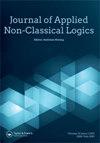Defeasible linear temporal logic
Q1 Arts and Humanities
引用次数: 0
Abstract
After the seminal work of Kraus, Lehmann and Magidor (formally known as the KLM approach) on conditionals and preferential models, many aspects of defeasibility in more complex formalisms have been studied in recent years. Examples of these aspects are the notion of typicality in description logic and defeasible necessity in modal logic. We discuss a new aspect of defeasibility that can be expressed in the case of temporal logic, which is the normality in an execution. In this contribution, we take Linear Temporal Logic ( ) as case study for this defeasible aspect. has found extensive applications in Computer Science and Artificial Intelligence, notably as a formal framework for representing and verifying computer systems that vary over time. However, some systems may presents exceptions at some innocuous time points where they can be tolerated, or conversely, exceptions at other crucial time points where they need to be addressed. In order to ensure the reliability of such systems, we study a preferential extension of , called defeasible linear temporal logic ( ). In the first part of this paper, we show how semantics of KLM's preferential models can be integrated with . We also discuss the addition of non-monotonic temporal operators as a way to formalise defeasible properties of these systems. The second part of this paper is a study of the satisfiability problem of sentences. Based on Sistla and Clarke's work on the complexity of the classical language, we show the bounded-model property of two fragments of language. Moreover, we provide a procedure to check the satisfiability of sentences in both of these fragments.可废止的线性时间逻辑
在Kraus, Lehmann和Magidor(正式称为KLM方法)对条件和优先模型进行开创性工作之后,近年来研究了更复杂形式的许多方面的可操作性。这些方面的例子是描述逻辑中的典型性概念和模态逻辑中的可废除必要性。我们讨论了可否定性的一个新方面,它可以在时间逻辑的情况下表示,即执行中的正态性。在这篇文章中,我们以线性时间逻辑()作为案例研究这一可行方面。已经在计算机科学和人工智能中得到了广泛的应用,特别是作为一个正式的框架来表示和验证随时间变化的计算机系统。然而,有些系统可能会在一些无害的时间点出现异常,而这些时间点是可以容忍的,或者相反,在其他关键的时间点出现异常,而这些时间点需要处理异常。为了保证这类系统的可靠性,我们研究了一种称为可解线性时间逻辑()的优先扩展。在本文的第一部分中,我们展示了如何将荷航的优先模型的语义与。我们还讨论了非单调时间算子的加入作为形式化这些系统的可灭性的一种方法。第二部分是对句子可满足性问题的研究。基于Sistla和Clarke对古典语言复杂性的研究,我们展示了两个语言片段的有界模型性质。此外,我们还提供了一个程序来检查这两个片段中句子的可满足性。
本文章由计算机程序翻译,如有差异,请以英文原文为准。
求助全文
约1分钟内获得全文
求助全文
来源期刊

Journal of Applied Non-Classical Logics
Arts and Humanities-Philosophy
CiteScore
1.30
自引率
0.00%
发文量
8
 求助内容:
求助内容: 应助结果提醒方式:
应助结果提醒方式:


